1. ‘Abdullah ibn ‘Umar (rta)
حدثنا يوسف بن موسي القطان البغدادي حدثنا
علي بن قادم حدثنا علي بن صالح بن حيي عن حكيم بن جبير عن جميع
بن عمير التيمي عن بن عمر قال آخي رسول اللّٰه صلي اللّٰه
عليه وسلم بين أصحابه فجاء علي تدمع عيناه فقال يا رسول
اللّٰه آخيت بين أصحابك ولم تؤاخ بيني وبين أحد فقال له رسول
اللّٰه صلي اللّٰه عليه وسلم أنت أخي في الدنيا والآخرة قال
أبو عيسي هذا حديث حسن غريب وفي الباب عن زيد بن أبي أوفي
‘Abdullah ibn ‘Umar said: “God’s Messenger (sws)
established ties of brotherhood between his companions. So,
‘Ali came along with tears in his eyes and said: ‘O God’s
Messenger (sws), you have established ties of brotherhood
between your companions and not established my brotherhood
ties with anyone.’ At this, God’s Messenger said: ‘You are
my brother in this world and in the hereafter.’”
Following is the schematic
illustration of the variants of this narrative:
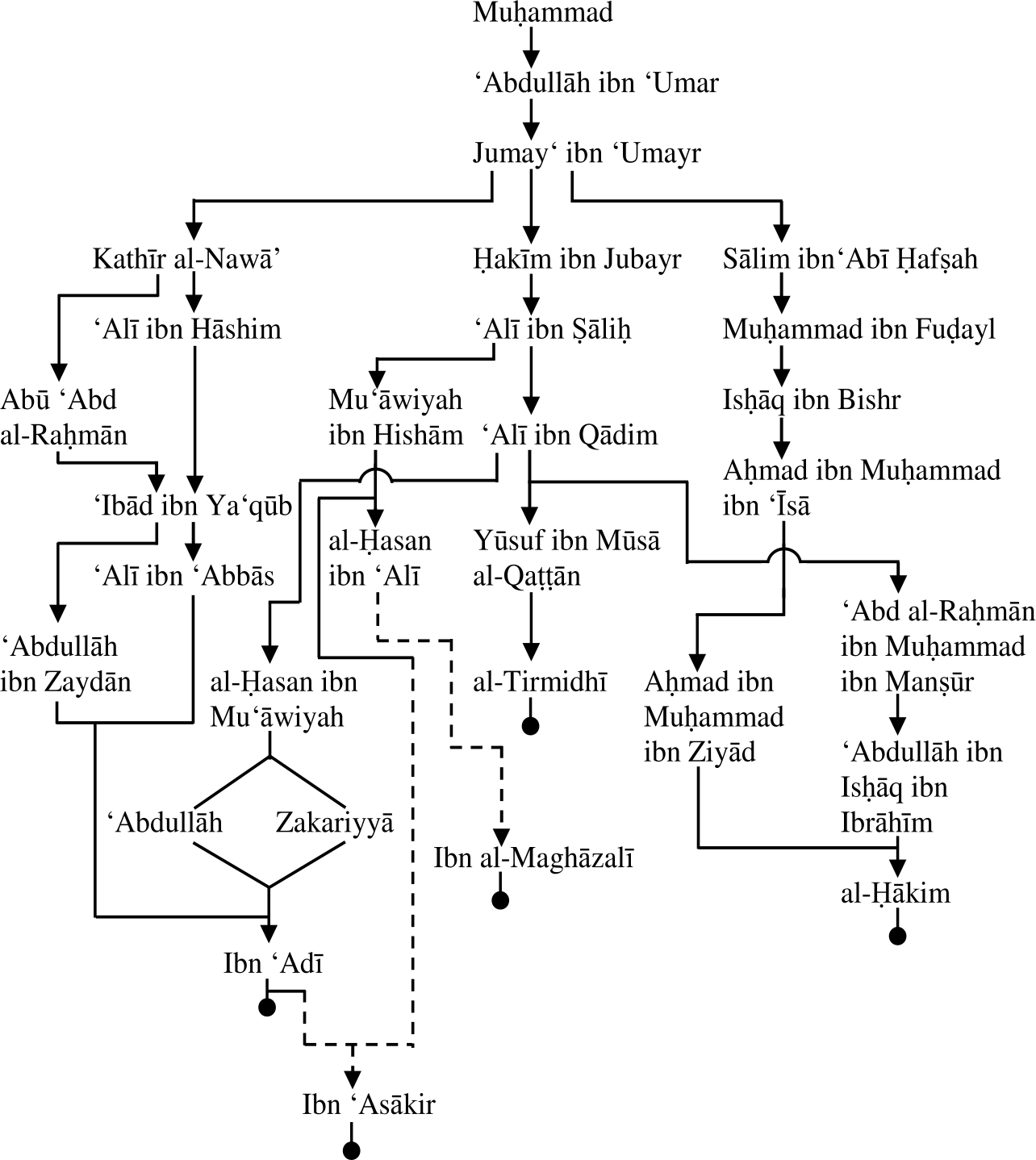
Al-Dhahabi records the following jarh
on Jumay‘ ibn ‘Umayr: Al-Bukhari says fihi naẓar; Ibn Hibban
says that he is a rafidi who fabricates narratives; Ibn
Numayr says that he is worst of all liars; Ibn ‘Adi says
that most of what he narrates is not corroborated; Ibn Hatim
says that he is a very staunch Shiite but is salih al-hadith.
About Hakim ibn Jubayr, Ibn Hibban
records: he is an extremist Shiite and makes a lot of
mistakes; Ahmad ibn Hanbal was not happy with him; Malik did
not narrate from him and said that he feared ending up in
Hell if he narrated from him; Abd al-Rahman ibn Mahdi would
not narrate from him either; Yahya said that he is la shay’.
About Kathir al-Nawa’, Ibn al-Jawzi
records: according to Abu Hatim al-Razi and al-Nasa’i, he is
da‘if; al-Sa‘di says that he is deviant (za’igh) and Ibn
Hibban says that he is an extremist Shiite.
Al-Dhahabi says that Salim ibn Abi
Hafsah e is an extremist Shiite.
Ibn Hibban records: he would mix up narratives and
make errors; Yahya and ‘Abd al-Rahman would not narrate from
him.
About Muhammad ibn Fudayl ibn Ghazwan, al-Dhahabi says
that he is a Shiite.
2. Anas ibn Malik (rta)
أخبرنا أبو القاسم بن السمرقندي أنا أبو
القاسم بن الخلال أنا أبو عبد اللّٰه أحمد بن محمد بن يوسف بن
دوست العلاف نا عمر بن الحسن القاضي أنا جعفر بن محمد بن سعيد
البجلي نا الحسن بن الحسين العرني نا عمرو بن ثابت عن أبي عبد
الله بياع الساج عن الحسن عن أنس قال سمعت رسول اللّٰه صلي
اللّٰه عليه وسلم يقول لعلي أنت أخي في الدنيا والاخرة ح
Anas stated: “I heard God’s Messenger say: ‘Perhaps you
and me will be brothers in this world and in the next.’”
Following is the schematic
illustration of the variants of this narrative:
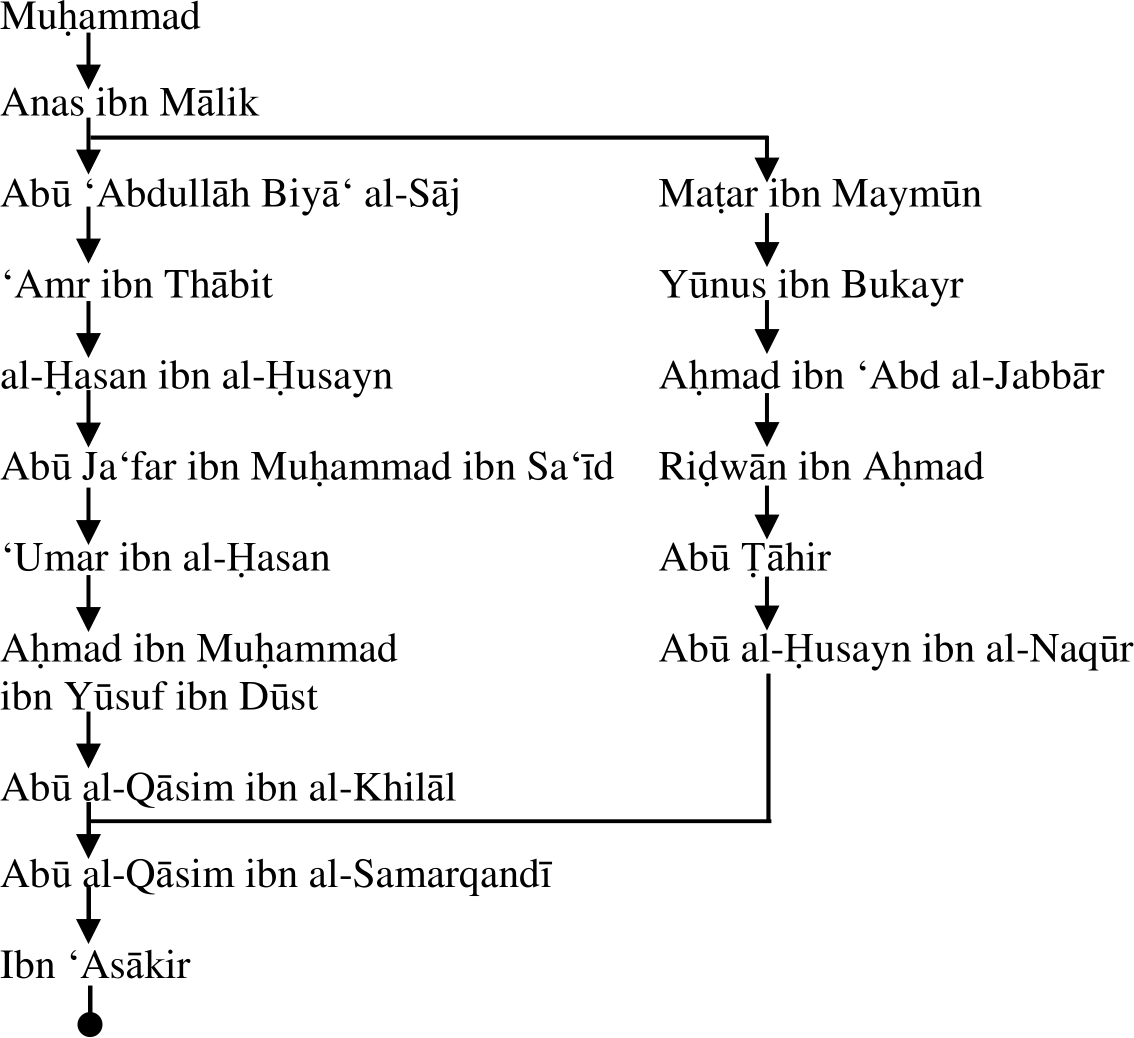
Abu ‘Abdullah Baya‘ al-Saj is unidentifiable and
information about him is not found in any extant work.
It is evident from a narrative that ‘Amr ibn Thabit is
actually Abu al-Miqdam ‘Amr ibn Thabit ibn Hurmuz.
Although Shiite rijal authorities regard
him to be reliable, here is what some of the Sunni rijal
authorities say about him, as recorded by al-Mizzi: Al-Hasan
ibn ‘Īsa reports that Ibn Mubarak had abandoned his
narratives. Muhammad ibn al-Muthanna says that he never
heard ‘Abd al-Rahman ibn al-Mahdi narrate from him. In the
opinion of Yahya ibn Ma‘in, as reported by ‘Abbas al-Duri,
he is laysa bi thiqah wa la ma’mun wa la yuktabu hadithuhu.
Abu Zur‘ah al-Razi says that he is da‘if al-hadith. Abu
Hatim says that he is da‘if al-hadith yuktabu hadithuhu,
kana radi al-ra’y shadid al-tashayyu‘. According to al-Bukhari
he is laysa bi al-qawi ‘indahum. According to al-Nasa’i, he
is laysa bi thiqah wa la ma’mun. Ibn Hibban says that he
narrates fabricated narratives from reliable narrators.
About al-Husayn ibn al-Hasan al-‘Arni,
al-Dhahabi records: Abu Hatim says that he is not saduq in
the opinión of authorities and is from among the leaders of
Shiites; Ibn ‘Adi says that his narratives do not remember
the narratives of trustworthy narrators; Ibn Hibban says
that he narrates al-mulzaqat from trustworthy narratives and
also al-maqlubat.
About Matar ibn Maymun al-Muharibi,
Ibn al-Jawzi records: al-Bukhari regards him to be munkar
al-hadith; al-Azdi says that he is matruk; Ibn Hibban says
that it is not permissible to narrate from him.
About Ahmad ibn ‘Abd al-Jabbar ibn Muhammad (d. 272 AH),
al-Mizzi records: ‘Abd al-Rahman ibn Abi Hatim wrote his
narratives but did not narrate from him; Muhammad ibn
‘Abdullah al-Hadrami says that he is a liar; al-Hakim says
that authorities regard him to be weak; Ibn ‘Uqdah
abandoned him; on the other hand Abu Kurayb has praised him
and al-Daraqutni says la ba’sa bihi.
3. Asma bint ‘Umays (rta)
ثنا أحمد بن الحسين الصوفي ثنا أحمد بن عبد
الملك الأودي قال ثناأحمد بن المفضل ثنا جعفر الأحمر عن عمران
بن سليمان عن حصين الثعلبي عن أسماء بنت عميس قالت قال رسول
اللّٰه صلي اللّٰه عليه وسلم أقول كما قال أخي موسي عليه
السلام رب اشرح لي صدري ويسر لي أمري واجعل لي وزيرا من أهلي
علي الي آخر الآية
Asma’ bint ‘Umays stated: “God’s Messenger said: ‘I say
the same words which my brother Moses said: “God open my
heart for me; make my task easier for me; make a helper from
my family – my brother ‘Ali – strengthen my back through
him.”’”
Following is the schematic
illustration of the isnad of this narrative:
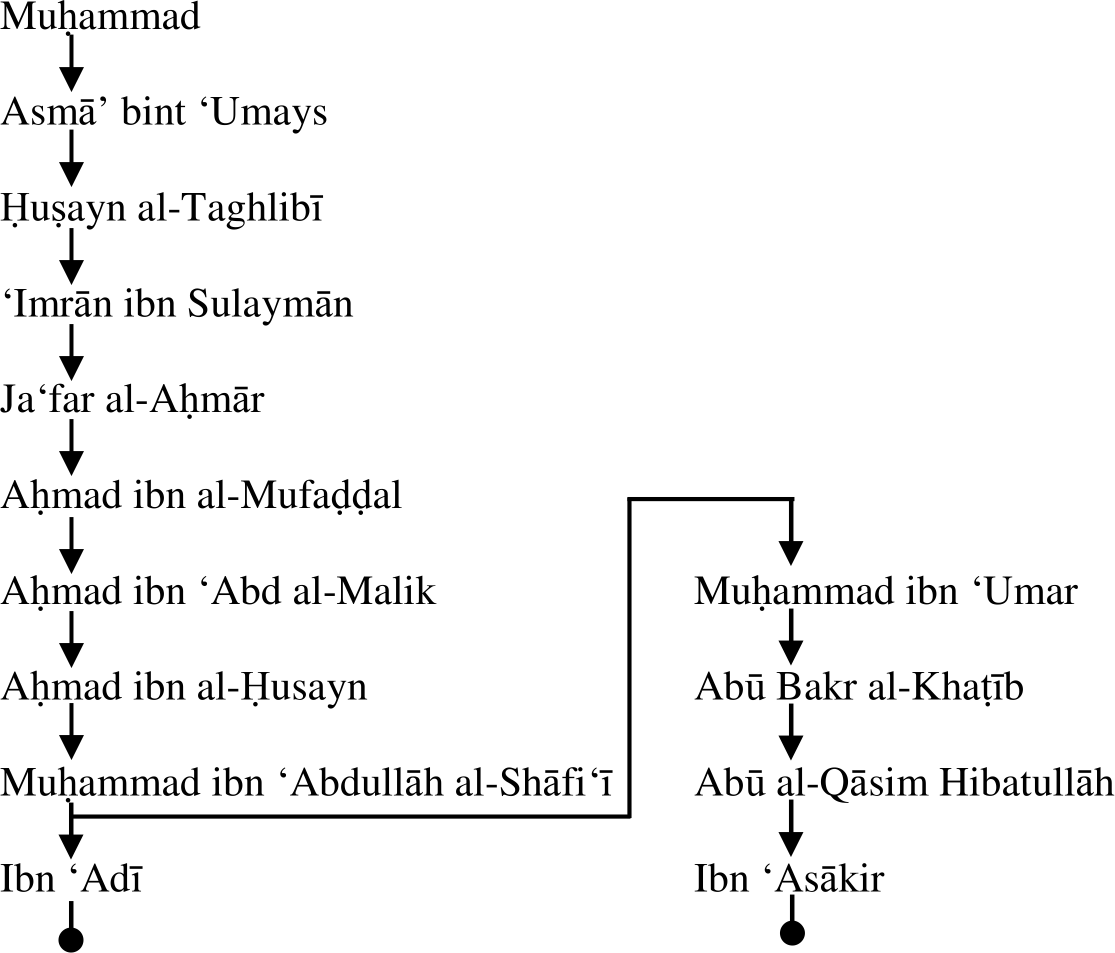
About Husayn ibn Yazid al-Taghlibi, al-Bukhari says: fihi
nazar.
Authorities agree that Ja‘far ibn Ziyad al-Ahmar is a
Shiite.
Sunni books do not have any information on Ahmad ibn al-Husayn
ibn ‘Abd al-Malik.
4. Mahduj ibn Zayd al-Zuhali (rta)
حدثنا الحسن قثنا أبو عبد اللّٰه الحسين
بن راشد الطفاوي والصباح بن عبد اللّٰه أبو بشر جار بدل بن
المحبر يتقاربان في اللفظ ويزيد أحدهما علي صاحبه قالا نا قيس
بن الربيع قثنا سعد الخفاف عن عطية عن محدوج بن زيد ان رسول
اللّٰه صلي اللّٰه عليه وسلم آخي بين المسلمين ثم قال يا علي
أنت أخي وأنت مني بمنزلة هارون من موسي غير انه لا نبي بعدي
Mahduj ibn Zayd al-Zuhali said that
when God established ties of brotherhood between the Muslims
he held the hand of ‘Ali and placed it on his chest and
said: “O ‘Ali you are my brother and have the same status
for me as Aaron had for Moses except that there is no
prophet after me.”
Following is the schematic
illustration of the isnad of this narrative:
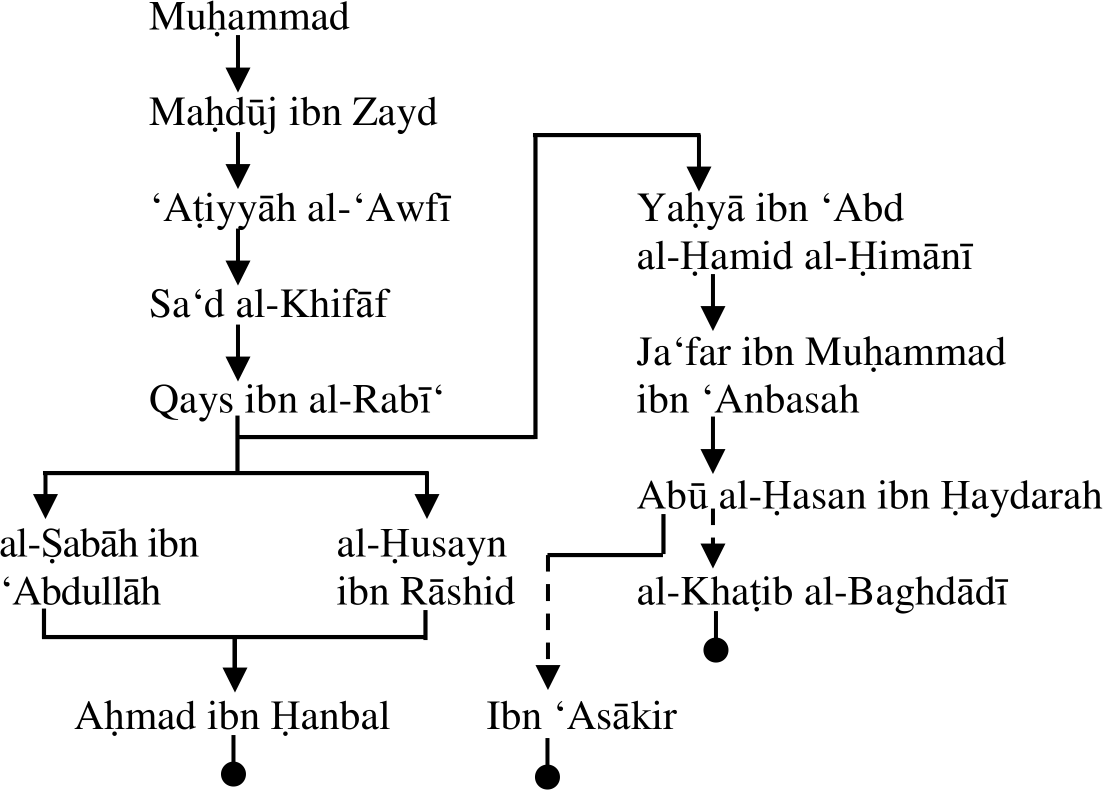
Al-Ala’i records that according to al-Saghani it cannot
be fully confirmed if he is a companion or not.
About ‘Atiyyah ibn Sa‘d al-‘Awfi (d. 111
AH), al-Dhahabi records that Ahmad
ibn Hanbal, al-Nasa’i, Abu Hatim and a host of others have
regarded him to be da‘if.
The narrative under discussion contains his ‘an‘anah and he
is also a mudallis. According to Ibn Hajar, he is guilty of
al-tadlis al-qabih.
Ibn Hibban has mentioned him in his
Al-Majruhin.
About Sa‘d al-Khifaf (Sa‘d ibn Tarif
al-Iskaf), Ibn al-Jawzi records: Yahya on one occasion said
that he is laysa bi shay’ and on another occasion says that
it is not permissible for anyone to narrate from him; ‘Amr
ibn ‘Ali and Abu Hatim say that he is da‘if al-hadith; al-Nasa’i,
al-Daraqutni and al-Azdi regard him to be matruk al-hadith;
al-Sa‘di says that he is condemnable (madhmum); Ibn Hibban
says that he fabricates narratives on the spot.
5. Hudhayfah ibn al-Yaman (rta)
أخبرنا أبو غالب محمد بن أحمد بن سهل
النحوي قال: حدثنا إبراهيم بن محمد، حدثنا محمد بن عبد الله بن
المطلب السيباني قال حدثنا إبراهيم بن بشر، حدثنا منصور بن أبي
نويرة الأسدي قال حدثنا عمرو بن شمر عن إبراهيم بن عبد الأعلي،
عن سعد بن حذيفة عن أبيه حذيفة بن اليمان قال: آخي رسول الله
صلي الله عليه وسلم بين أصحابه الأنصار والمهاجرين، فكان يؤاخي
بين الرجل ونظيره، ثم أخذ بيد علي بن أبي طالب فقال هذا أخي
Hudhayfah ibn al-Yaman stated: “God’s
Messenger established ties of brotherhood between his
companions among the ansar and the muhajirun. Thus, he would
do this between people who were similar. He then took ‘Ali
by his hand and said: ‘This is my brother.’”
Following is the schematic
illustration of the isnad of this narrative:
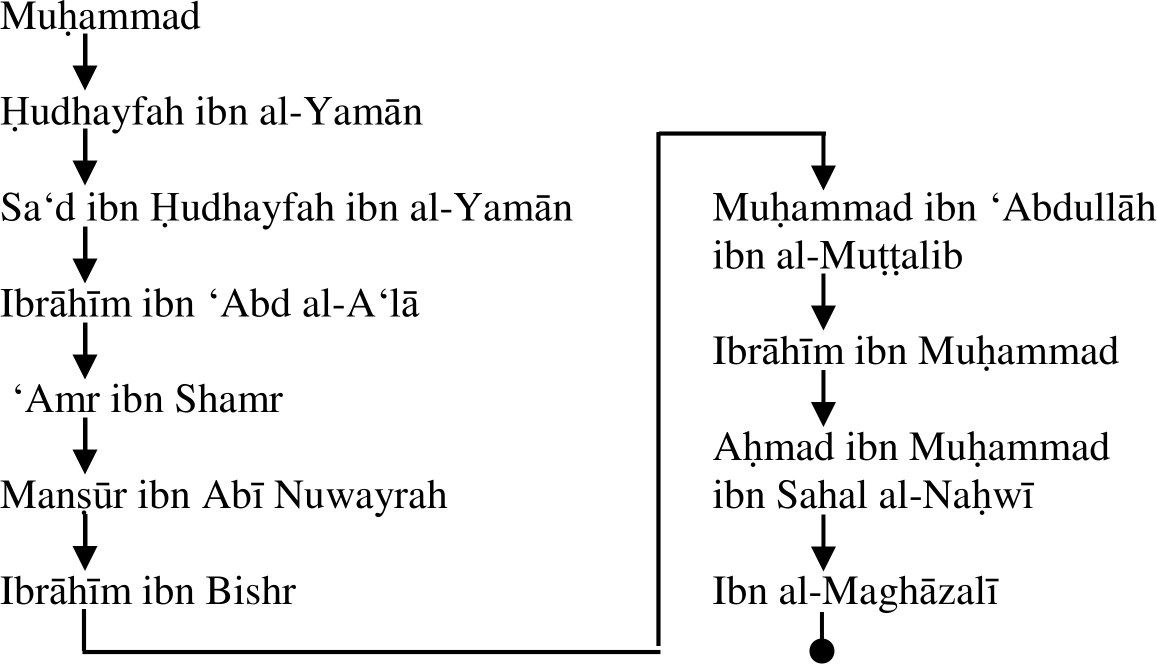
Ibn al-Jawzi records: on one occasion
Yahya ibn Ma‘in regarded him to be laysa bi thiqah and on
another said that he is laysa bi shay’ la yuktabu hadithuhu;
al-Sa‘di says that he is za’igh kadhdhab; al-Bukhari says
that he is munkar al-hadith; al-Nasa’i, Abu Hatim al-Razi,
al-Azdi and al-Daraqutni say that he is matruk; ‘Amr ibn
‘Ali says that he is wahi al-hadith; Ibn Hibban says that he
narrates fabricated narratives from trustworthy narrators
and it is not permissible to narrate from him except to
express amazement.
Ibn ‘Adi says that the narratives of
Mansur ibn Ya ‘qub ibn Abi Nuwayrah has things that are not
securely reported.
Abu Hatim says that Ibrahim ibn Bishr whether al-Azdi or
al-Kasa’i, both are majhul.
6. ‘Abdullah ibn ‘Abbas (rta)
i.
أخبرنا أبو الحسن علي بن أحمد بن المظفر
العدل وأحمد بن محمد بن عبد الوهاب بن طاوان الواسطيان
-بقراءتي عليهما فأقرا به- قلت لهما حدثكما أبو إسحاق إبراهيم
بن أحمد الطبري بواسط في شعبان سنة ثمان وثمانين وثلاثمائة قال
حدثنا أبو عمر محمد بن عبد الواحد بن عبد اللّٰه اللغوي، حدثنا
محمد بن عثمان بن محمد العبسي، حدثنا عبادة بن زياد الأسدي،
حدثنا يحيي بن العلاء الرازي عن جعفر بن محمد عن أبيه عن ابن
عباس قال نظر علي بن أبي طالب عليه السلام في وجوه الناس فقال
إني لأخو رسول الله ووزيره، وقد علمتم أني أولكم إيمانا
باللّٰه ورسوله، ثم دخلتم بعدي في الإسلام رسلاً، وإني لابن عم
رسول الله صلي الله عليه وسلم وأخوه، وشريكه في نسبه…
ولقد آخى بين المسلمين فما اختار لنفسه أحداً غيري، ولقد قال
لي أنت أخي وأنا أخوك في الدنيا والآخرة
‘Abdullah ibn ‘Abbas stated: “ ‘Ali
stared at the faces of people and said: ‘I am the brother of
God’s Messenger and his helper and share his lineage … And
he had established ties of brotherhood between Muslims and
chosen me for himself in place of any other person. He had
said to me: “You are my brother and I am yours in this world
and in the next.”’”v
Following is the schematic
illustration of the isnad of this narrative:
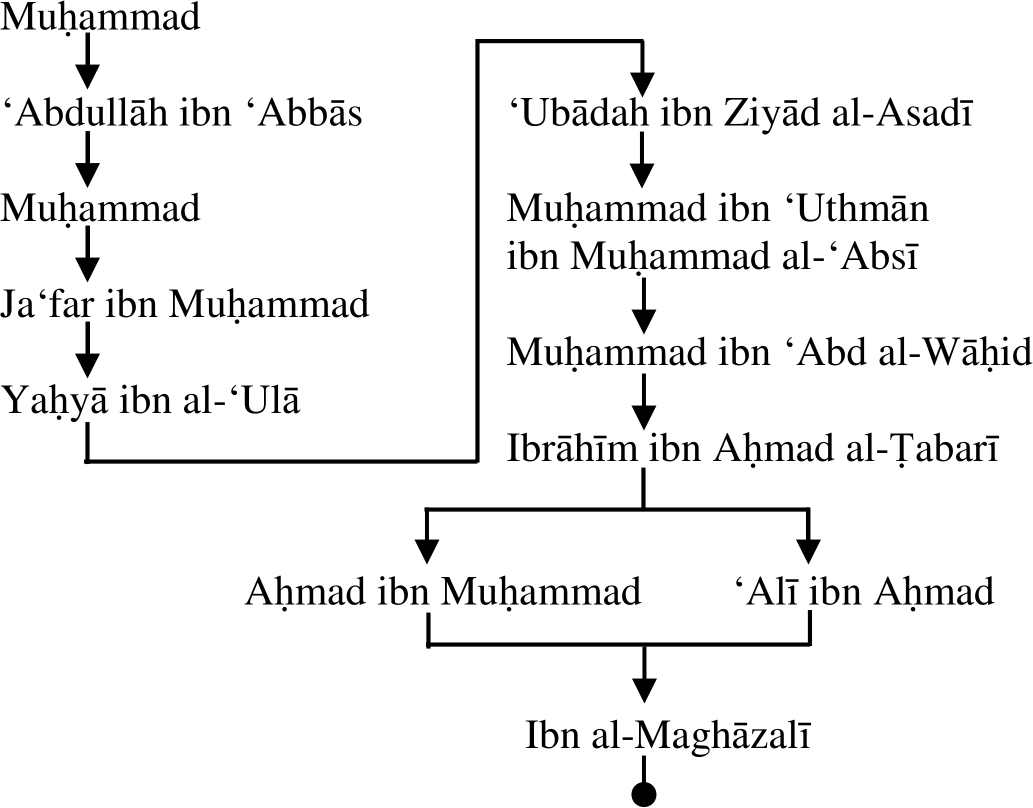
About Yahya ibn al-‘Ula al-Razi, Ibn
Hibban says that it is not permissible to narrate from him.
About ‘Ubadah ibn Ziyad al-Asadi, Abu
Hatim says that he is among the leaders of the Shiites.
ii.
حدثنا محمود بن محمد المروزي ثنا حامد بن
آدم المروزي ثنا جرير عن ليث عن مجاهد عن بن عباس قال لما آخا
النبي صلي اللّٰه عليه وسلم بين أصحابه بين المهاجرين والأنصار
فلم يؤاخ بين علي بن أبي طالب وبين أحد منهم خرج علي رضي
اللّٰه عنه مغضبا حتي أتي جدولا من الأرض فتسود فتوسد ذراعه
فسفّ عليه الريح فطلبه النبي صلي اللّٰه عليه وسلم حتي وجده
فوكزه برجله فقال له قم فما صلحت أن تكون إلا أبا تراب أغضبت
علي حين واخيت بين المهاجرين والأنصار ولم أواخ بينك وبين أحد
منهم أما ترضي أن تكون مني بمنزلة هارون من موسي ألا إنه ليس
بعدي نبي
‘Abdullah ibn ‘Abbas stated: “When the Prophet (sws)
established ties of brotherhood between his companions and
between the muhajirun and the ansar, he did not make anyone
‘Ali’s brother. This prompted ‘Ali to go out in anger until
he came to a fountain sprouting from the land. He inserted
his arm in it and the wind blew on it. The Prophet (sws)
went in search for him until he found him and struck him
with his leg and said to him: ‘Stand up and be known as Abu
Turab. Are you angry with me that I established ties of
brotherhood between the muhajirun and the ansar and did not
do so between you any other person from among them? Would
you not be happy if you are regarded to have the same status
with respect to me as what Aaron had to Moses expect that
there is no prophet after me.’”
Following is the schematic
illustration of the isnad of this narrative:
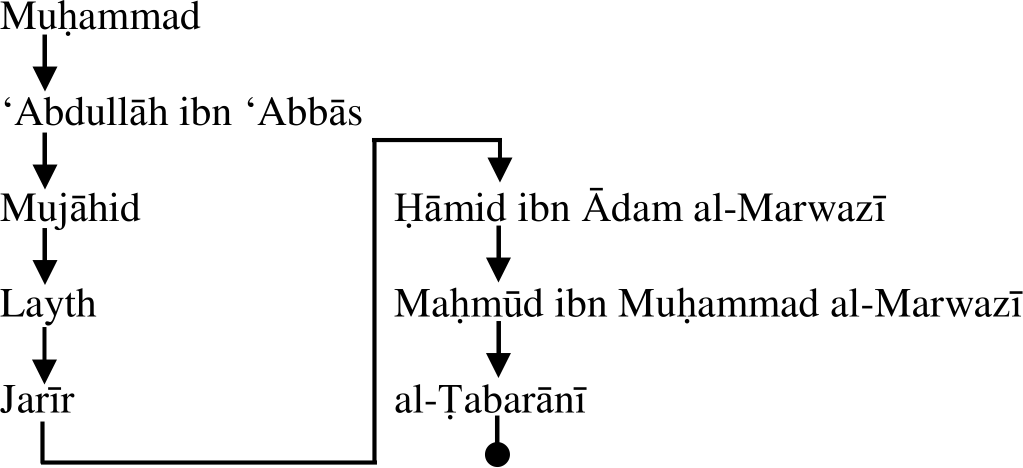
About Hamid ibn Adam al-Marwazi, al-Dhahabi
records: ‘Abdullah ibn al-Mubarak, al-Juzjani, Yahya ibn
Ma‘in and Ibn ‘Adi regard him to be a liar and Ahmad ibn
‘Ali al-Salmani says that he is among famous fabricators of
narrative.
______________
|